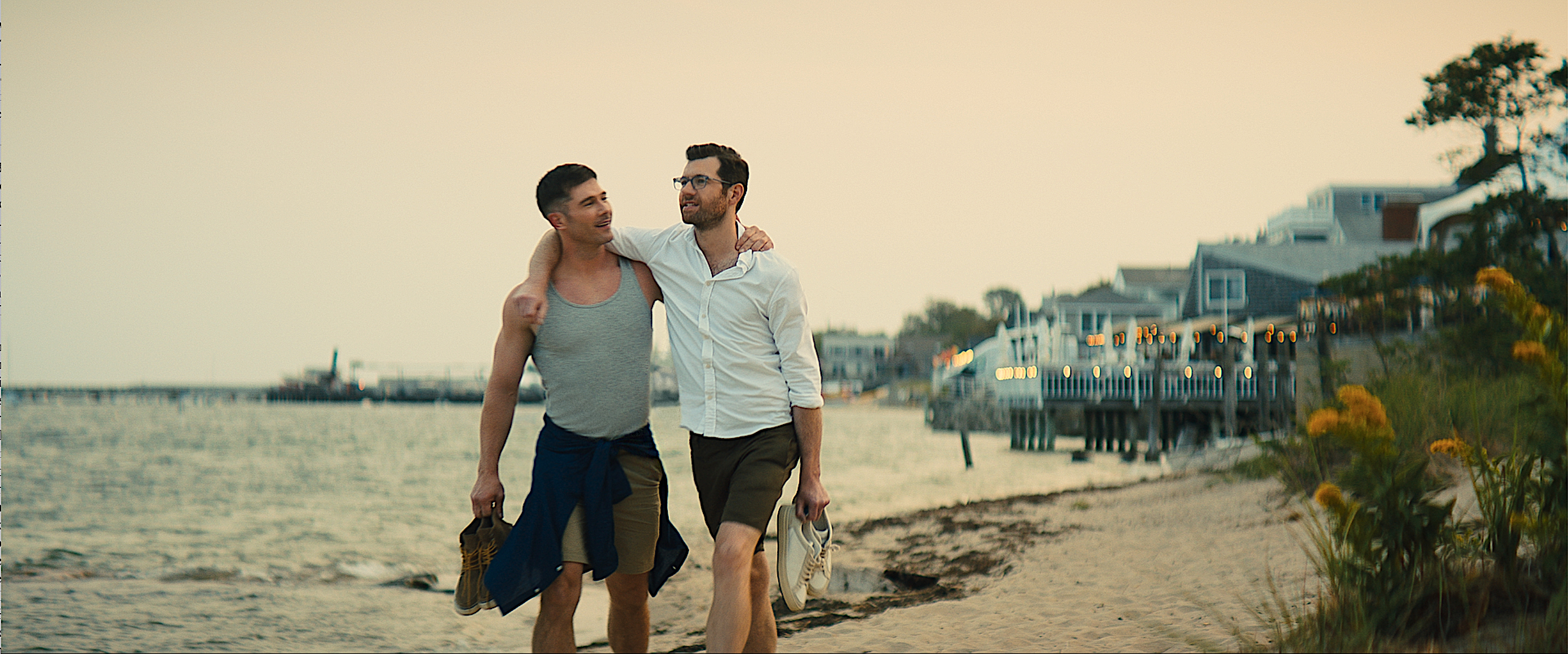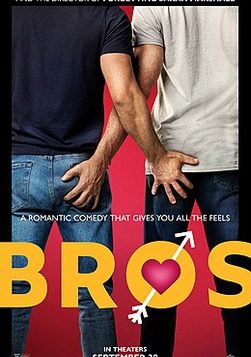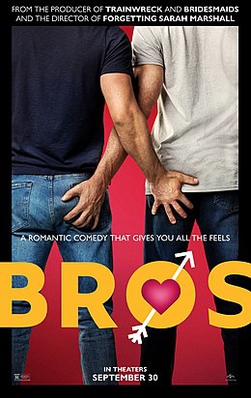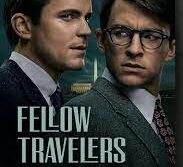LET’S START WITH the unfortunate fact that Bros bombed at the box office. Sadly, Hollywood’s first attempt at a queer romcom generated more discussion postmortem than it did before its release, despite a major marketing campaign and the imprimatur of Judd Apatow (The 40-Year-Old Virgin, This Is 40), a writer-producer so successful that his surname has become an adjective: “Apatowian.” Bros, co-written by Billy Eichner (Parks and Recreation), made news less for its gross Apatowian jokes than for it what failed to gross. It earned a meager eleven million box-office dollars in the U.S., though its budget was twice that amount. Eichner, understandably disappointed, has since pointed the finger at gay-friendly allies who opted, in the new era of multiple streaming services, for their sofas over the cinema. But is he right?
Commentators on the gay podcast Peanut Gallery all rushed in with their theories as to why Bros fell short of expectations. They ranged from the film’s October release (traditionally reserved for Halloween hair-raisers) to the film’s insipid theatrical poster (a pair of faceless dudes grabbing each other’s backsides) to a lack of star power and the fact that the romcom itself has become a rarity. My money is on the last of these. Romcoms are rapidly becoming an endangered species: the number released in the last decade averages about four per year versus fourteen in the previous few decades. Also, Bros may have failed because it conforms to the predictable contours of the romcom too closely. There’s the meet-cute moment—the hunk and the egghead meet in a club and don’t hit it off at first, until they do, followed by a temporary breakup after hunk flirts with a stranger and egghead gets angry, but ultimately wants him back. In short, Bros plays it straight with the romcom format to its detriment.
Eichner is gay culture’s MVM—most valuable motormouth. Between 2011 and ’17, he was best known for thrusting a microphone (and a crumpled dollar bill) into strangers’ faces and grilling them about pop culture. One of the standouts was Eichner running alongside what he called “a wild pack of lesbians” and shouting questions like “For a dollar, who’s sexier, Britney Spears or Meryl Streep?” Surrounding him in Bros is a cascade of high-profile cameos who still couldn’t catapult the film into the big leagues. They include Kristin Chenoweth, Ben Stiller, Bowen Yang (as a benefactor in Provincetown), and Amy Schumer (as a hologram of Eleanor Roosevelt). Upstaging them all is Debra Messing of Will & Grace fame, who kvetches to Bobby Lieber (Eichner’s alter ego) that she is not “Grace” in real life, and she’s tired of gay men unloading their relationship problems on her.
Bobby is a jaded forty-something who has, like any successful New Yorker, prioritized his career over his romantic life. As a result, he’s wound up overtired and bitter. Bobby is representative of a class of metropolitan men whose morning ritual includes blocking guys on Grindr while sitting on the toilet. In addition to his job as a podcast host, Bobby is a co-curator of a soon-to-open museum in Manhattan dedicated to lgbtq+ history, and his fellow board members provide some of the film’s biggest laughs. Yet Bobby is too solipsistic to be a believable historian. He blurts out lines like “They had AIDS, we had Glee” and “We are horny and selfish and stupid.” He later burns Pete Buttigieg in effigy, or, more accurately, attacks a bust of the current U.S. Secretary of Transportation, because he’s too mainstream, too cis, too “normal.”

It’s been more than forty years since Vito Russo, in The Celluloid Closet, catalogued the appearances of gay people in film history and the stereotypes from which they could never escape onscreen. In Bros’ defense, none of those stock characters (the sissy, the predator, the asexual best friend) are present here. Instead, Bros offers us a comically light love story. Bobby’s Romeo is heartthrob Luke Macfarlane, a longstanding lead in a slew of Hallmark Channel romances with titles that say it all: The Mistletoe Promise, A Shoe Addict’s Christmas, and Sense, Sensibility and Snowmen. In 2006, Macfarlane played a gay man on ABC’s Brothers and Sisters, and since that time the Canada native came out himself. Referring to Bros, he told People magazine (10/17/22): “It’s a gay movie where a couple has a happy ending. We don’t get a lot of those.”
Macfarlane is right: a happily-ever-after ending is never in doubt. Before Bros wraps itself in a bow, however, the most stinging scene is when Bobby rants and raves about how he could never meet the expectations that straight society has set, and how he grew up without positive gay role models to affirm his existence. Sitting on a beach in Provincetown, he vents angrily to Aaron that he always had to work harder than his lazy, straight coworkers in order prove himself “perfect.” The prevailing point of Bobby’s outburst is that he grew up, like so many LGBT people, starving for representation on screen and good gay guys to emulate. Even the good-natured but shallow Aaron is made a teensy bit anxious by Bobby’s laundry list of resentments, so, like any good boyfriend, he begins to dance around in order to lighten the mood.
Another provocative idea buried in the script by Eichner and co-writer Nicholas Stoller is that all romantic love is not the same, which flies in the face of the love-is-love mantra that LGBT folks often espouse. The awkward sex scenes bear out this idea when Bobby and Aaron wrestle in their underwear, sniff poppers, and end up with post-coital grins to match. The other board members with whom Bobby works also bang their fists on the table and insist that while love is a good thing, love is about as subjective as it gets. The idea that gay romance is not your father’s form of romance rears its head one last time when Aaron’s brother (played by former Queer Eye for the Straight Guy host Jai Rodriguez) comforts him during his brief breakup from Bobby. “My story is not your story,” Jason chides Aaron. Only time will tell whether Bros finds its long-lost family on the small screen or remains the proverbial red-headed stepchild.
Colin Carman, assistant professor of English at Colorado Mesa University, is the author of The Radical Ecology of the Shelleys.








Discussion1 Comment
I never liked straight rom-coms. Tell me why, I’d want to see a movie, where homosexual guys ape heterosexual tropes. I wouldn’t waste my time.